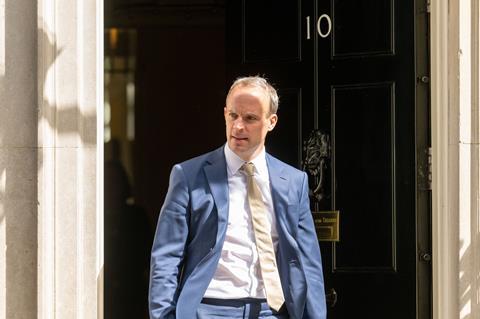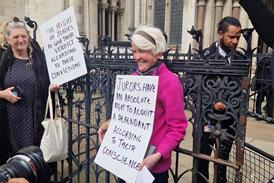Courts will have greater powers to throw out so-called strategic litigation against public participation (SLAPPs) and a costs protection scheme will be introduced to ‘level the playing field between wealthy claimants with deep pockets and defendants’, the government has announced.
Journalists and campaigners facing a SLAPP case will be able to rely on a three-part test to determine whether the claim should be dismissed immediately, with courts required to first decide if the claim is brought ‘against activity in the public interest’.
The court will then examine if there is any evidence of an abuse of process, ‘such as whether the claimant has sent a barrage of highly aggressive letters on a trivial matter’, before considering whether the case has a realistic prospect of success.
Anyone subject to a suspected SLAPP ‘will be able to apply to the court to have it considered for early dismissal’, the government said today.
Costs protection for defendants will also be introduced ‘to shield those fighting lawsuits from crippling costs and enable meritless cases to be properly defended’ – though the level of any costs cap has not been decided.

The move follows mounting pressure on the government and regulators – as well as individuals lawyers, who have been criticised in parliament for providing ‘a one-stop corruption shop to offer a form of legalised intimidation’ – following Russia’s invasion of Ukraine.
Plans to clamp down on SLAPPs were first announced in March by lord chancellor Dominic Raab, who emphasised the government’s intention to ‘end the abuse in UK courts, and of UK laws, by corrupt oligarchs and Putin allies to protect democratic debate’.
Raab said today: ‘We won’t let those bankrolling Putin exploit the UK’s legal jurisdiction to muzzle their critics. So, today, I’m announcing reforms to uphold freedom of speech, end the abuse of our justice system and defend those who bravely shine a light on corruption.’
The announcement was welcomed by campaigners against SLAPPs. Charlie Holt, campaigns manager at English PEN, said: 'The government’s proposals provide a solid foundation for tackling the problem of SLAPPs. With this framework in place, the government must now ensure its proposed law is sufficiently ambitious to decisively tackle the problem of SLAPPs. This is a once-in-a-generation opportunity to protect public public watchdogs from abusive lawsuits – it’s crucial the government’s measures do not fall short of what is needed.'
Michelle Stanistreet, general secretary of the National Union of Journalists, described the government’s proposals as ‘a significant step in tackling the deployment of SLAPPs and other forms of lawfare designed to stymie journalistic investigations’.
Dawn Alford, executive director of the Society of Editors, welcomed the announcement and said that ‘for too long, wealthy and powerful individuals and corporations have been able to weaponise and abuse the legal system to avoid public scrutiny’.
She added: ‘The introduction of a new mechanism to allow the courts to throw out meritless cases more quickly and a cap on costs are essential protections that should deter the wealthy from using the threat of expensive litigation to silence their critics and should allow journalists and others the ability to fulfil their roles as the public’s watchdog without bullying or intimidation.’
This article is now closed for comment.


















![David Lester (senior partner at Blythe Liggins), Darryl Barnes, Jagdeep Sandher (head of dispute resolution at Blythe Liggins)[4]](https://d1d8vslyhr7rdg.cloudfront.net/Pictures/274x183/4/2/8/116428_davidlesterseniorpartneratblytheligginsdarrylbarnesjagdeepsandherheadofdisputeresolutionatblytheliggins4_981603_crop.jpg)





4 Readers' comments